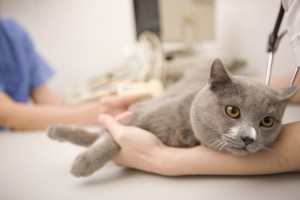Baseline of Health, Wellness Care, and Pet Disease Prevention
 Chances are when you go to see your physician, basic baseline information gathering, such as blood pressure, pulse, temperature, and weight, are a part of your physical examination. This information can act as a baseline or your normal state of health, which in turn can alert your doctor to any changes. This same idea is applied when it comes to pet disease prevention and overall wellness.
Chances are when you go to see your physician, basic baseline information gathering, such as blood pressure, pulse, temperature, and weight, are a part of your physical examination. This information can act as a baseline or your normal state of health, which in turn can alert your doctor to any changes. This same idea is applied when it comes to pet disease prevention and overall wellness.
At home, many pet owners also make note of their pets’ daily health status. Pet owners are often the first to notice subtle changes in appetite, behavior, and general energy level. This body of information, collectively, helps to form a baseline of health for pets which, when communicated with your pet’s veterinarian, can be useful in diagnosis.
Pet Disease Prevention: Your Pet’s Best Defense
While some diseases are prompted by a genetic predisposition,lifestyle and age play significant roles, too. This is why annual wellness examinations are vital to catching suspicious changes in your pet’s blood chemistry, mobility, and internal organ health.
Through routine blood panels, urinalysis, and important screenings, we are able to have insight into what may not yet present as physical symptoms. Early detection offers us the best possible opportunity for treating conditions and diseases successfully, either through curing the condition entirely or through slowing down the progression of the disease.
Wellness care is formed from the idea that a preventive approach is healthier and less expensive and alarming than emergency care. Wellness care with the premise of maintaining a baseline of health generally relies on many sophisticated diagnostic tools and consistent physical examinations, as well as open communication between pet owner and veterinarian.
Other important aspects of preventive care include dental examinations, behavioral consultations, and nutrition and weight management recommendations.
Establishing Your Pet’s Health Baseline
You are with your pet every day. You provide food, exercise, interaction, and love to your pet and are probably the first to recognize when something just seems off. As a loving pet owner, you play a vital role in your pet’s normal level of energy and well-being and can help establish a baseline through your daily observation.
Some of the aspects of your pet’s health (of which you can observe and track each day/week) are:
- Changes in appetite or water consumption
- Litter box habits or frequency of accidents
- Fluctuations in energy levels and mobility
- Changes in behavior or temperament
- Changes to skin or coat condition
- Diminished interest in interacting with family or, conversely, a new-found “clinginess”
- Onset of mobility challenges (stiffness, joint pain)
- Noticeable physical symptoms like foul breath, limping, pawing at face, chewing at skin, and so forth.
Leon Valley Veterinary Hospital seeks to empower pet parents by providing recommendations and consultation on what to watch for in the daily care and well-being of pets. By maintaining vigilance and awareness of our pets’ overall health, we are better able to prevent certain conditions from developing and increase quality of life through all life stages.


